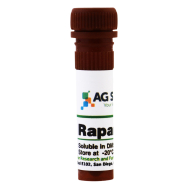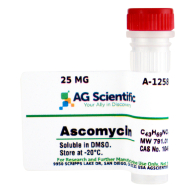A.G. Scientific is a leading supplier of the immunosuppressant, FK-506 commonly known as Tacrolimus. It is well known for its ability to prevent allograft rejection after transplantation.FK 506 resized 600 A.G.Scientific has long been established as a leading research supplier in the field of fermentation derived secondary metabolites.
FK506 (Tacrolimus): Frequently Asked Questions


AG Scientific has long been established as a leading biochemical supplier in the field of fermentation derived secondary metabolites and
immunosuppressants. One of our most popular is
FK506, commonly known as Tacrolimus or Fujimycin. It is well known for its ability to prevent post-operative
allograft rejection.
We offer a range of catalog sizes, as well as, multi-kilogram quantities for bulk applications. Additionally, we provide a
full service of bottling, sterile formulations, custom packaging, as well as comprehensive private labeling capabilities.
Here are the most common issues we hear about and what you should know prior to using FK506. We've included all the appropriate answers, as well as a
Material Safety Data Sheet (MSDS) to ease your research.
Frequently Asked Questions
1. What is FK506?
FK506 (also known as Tacrolimus or Fujimycin) is a calcineurin inhibitor that has been widely used to prevent allograft rejection after transplantation. The drug reduces the activity of the patient's immune system and thus lowers the risk of organ rejection after an organ transplant. It is also used in a topical preparation in the treatment of skin conditions such as atopic dermititis (eczema) and vitiligo, and also for severe refractory uveitis after bone marrow transplants.
Tacrolimus is a macrolide compound isolated from the bacterium
Streptomyces tsukubaensis. In T-cells, activation of the T-cell receptor normally increases intracellular calcium, which acts via calmodulin to activate calcineurin. Calcineurin then dephosphorylates the transcription factor NF-AT (nuclear factor of activated T-cells), which moves to the nucleus of the T-cell and increases the activity of genes coding for IL-2 and related cytokines. Tacrolimus prevents the dephosphorylation of NF-AT.
FK506 binds to the immunophilin FKBP12, reducing peptidyl-prolyl isomerase activity. This new FKBP12-FK506 complex interacts with and inhibits calcineurin thus inhibiting both T-lymphotye signal transduction and IL-2 transcription.
2. Synonyms for FK506?
Tacrolimus, Fujimycin, Tsukubaenolide, Prograf, Protopic, Modigraf, Advagraf, Protopy, Envarsus XR
3. What is the chemical formula?
C44H69NO12
4. What is the molecular weight?
You may see varying molecular weights for FK506, commonly cited as 804.03 vs. 822.03 Da.
Some may report a Molecular Weight of 804.03 less the water, see
Merck Index 14th edition (CAS 104987-11-3). However,
tacrolimus has an empirical formula of C44H69NO12 H2O and a formula weight of 822.03, (CAS 109581-93-3).
5. What is this product soluble in?
Fujimycin is soluble in methanol, ethanol (25 mg/mL), acetone, ethyl acetate, diethyl ether, chloroform, and dichloromethane. It is sparingly soluble in hexane, and petroleum ether. Insoluble in water.
Product forms a clear colorless solution at 10 mg/mL of: dichloromethane, ethyl acetate, and DMSO (25 mg/mL).




